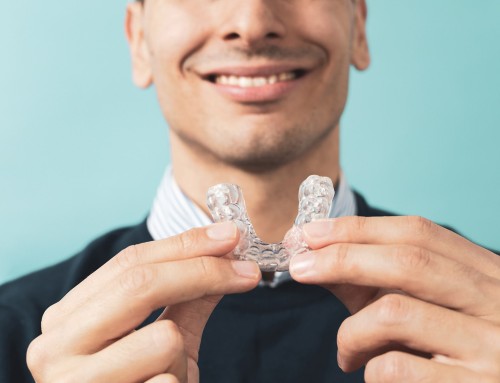If your teeth feel sore in the morning or your jaw pops and aches throughout the day, the right oral appliance can make a real difference. At our Anchorage dental office we help patients choose between a protective night guard, a therapeutic TMJ orthotic, and a sleep apnea night guard based on symptoms, goals, and everyday comfort.
What Is an Occlusal Guard?
An occlusal guard—often called a night guard—is a custom appliance that covers the teeth to cushion the effects of clenching and grinding. It protects your enamel and dental work so you can wake up with less wear and tear.
How an Occlusal Guard Works
A night guard creates a smooth, protective surface between the upper and lower teeth so they slide rather than grind. This barrier absorbs force from overactive chewing muscles and helps prevent cracked teeth and damaged restorations.
- Reduces chip and fracture risk during bruxism episodes
- Limits enamel wear and protects existing crowns or fillings
- Provides a comfortable, stable surface for nighttime clenching
When We Recommend a Night Guard
We suggest a night guard when the main problem is tooth damage from grinding or clenching, and jaw joints and muscles test as stable. It is a straightforward way to protect your smile while we track changes over time.
- Flattened, worn, or chipped teeth
- Morning tooth sensitivity or jaw tightness
- Evidence of clenching during stressful seasons or heavy workouts
Benefits and Limitations
A night guard offers easy protection, but does not change how your jaw joints and muscles work. If your symptoms point to a joint or muscle problem, we may recommend a TMJ orthotic for deeper relief.
- Benefits: simple, protective, and easy to wear
- Limitation: may not relax overworked muscles or unload sore joints
What Is a TMJ Orthotic?
A TMJ orthotic is a precision-made appliance designed to relax and stabilize your jaw. Improving the relationship between the jaw joint, muscles, and bite can reduce pain, clicking, and tension that affect daily life.
Signs You May Benefit From an Orthotic
We often consider an orthotic when symptoms go beyond tooth wear and involve joint or muscle strain. If any of the signs below sound familiar, Dr. Richard Crosby, DDS, can evaluate whether a therapeutic appliance is the right next step.
- Jaw pain, stiffness, or locking
- Popping or clicking when opening and closing
- Headaches, facial pain, or ear fullness
- Neck and shoulder tension linked to bite imbalance
- Uneven tooth contact or a shifting bite
Orthotic vs. Night Guard
While a night guard protects teeth from grinding, an orthotic aims to calm the system that drives the grinding; the goal is a more comfortable jaw posture that reduces muscle overuse and joint stress.
- Night guard: primarily protects teeth from wear
- TMJ orthotic: supports jaw alignment to ease TMJ-related symptoms
Sleep Apnea Night Guard (Oral Appliance Therapy) in Anchorage
Some snoring and sleep apnea cases respond well to a dental appliance that supports the airway. A sleep apnea night guard—also called mandibular advancement therapy—gently positions the lower jaw forward to help you breathe more freely at night.
How Oral Appliance Therapy Works
This treatment uses a compact, custom-fit device that you wear while sleeping. By guiding the lower jaw forward, it helps keep the tongue and soft tissues from collapsing into the airway, allowing you to enjoy quieter, more restorative sleep.
- Promotes airway openness to reduce snoring and apnea events
- Feels quiet and portable for home or travel
- Works under a physician’s diagnosis and follow-up testing
To explore how airway support fits into your overall plan, you can review our sleep apnea treatment options. These include comfortable oral appliances that fit easily into nightly routines.
Who Is a Good Candidate
Oral appliance therapy is often a good fit for snoring and many mild to moderate obstructive sleep apnea cases, especially for patients who want a mask-free solution. We coordinate with your medical team to make sure therapy is safe and effective for you.
- Confirmed snoring or mild–moderate obstructive sleep apnea
- Preference for a quiet, compact device
- Desire for a comfortable, travel-friendly option
For a closer look at how these custom devices are made and adjusted, see our overview of oral appliance therapy.
What To Expect During Treatment
We keep the process simple and supportive from start to finish. Your plan includes careful fitting and follow-up so your appliance feels good and works as it should.
- Consultation to review symptoms, goals, and health history
- Digital scans or impressions for a precise, custom fit.
- Delivery and adjustments to fine-tune comfort and breathin
- Collaboration with your physician for outcome verification
How We Diagnose and Personalize Care
Every smile—and every jaw—is different, so we begin with a thorough exam. Our goal is to match the appliance to the actual cause of your symptoms, not just the most common guess.
TMJ and Bite Evaluation
We evaluate your jaw joints, muscles, and bite to pinpoint where strain is coming from. This helps us decide whether tooth protection, jaw repositioning, or airway support—or a combination—will give you the best relief.
- Muscle and joint exam to locate painful or overactive areas
- Bite analysis to see how teeth come together and move
- Imaging or photos when needed to support precise planning
Many patients with jaw pain or headaches find relief through our comprehensive TMJ treatment in Anchorage, which often includes custom orthotics.
Collaboration for Sleep Testing
If your symptoms suggest sleep apnea, we coordinate with your physician for diagnosis and follow-up testing. This teamwork confirms that your appliance is doing its job and helps us keep you on track long term.
- Physician-directed sleep testing for accurate diagnosis
- Follow-up study to verify appliance effectiveness
- Ongoing adjustments to maintain great results
Anchorage Treatment Options at a Glance
Choosing the right appliance becomes much easier when you match it to your main goal. Use this quick summary as a starting point, then we will tailor your plan during your visit.
- Occlusal guard (night guard): best for protecting teeth from bruxism wear
- TMJ orthotic: best for relaxing muscles, unloading joints, and easing TMJ symptoms
- Sleep apnea oral appliance: best for airway support to reduce snoring and apnea events
FAQs: Night Guards, TMJ Orthotics, and Oral Appliances
Many patients share similar questions when deciding between a night guard and a TMJ orthotic or oral appliance therapy for snoring and sleep apnea. These answers can help you move forward with confidence.
Why Choose Dr. Richard Crosby for TMJ and Oral Appliance Therapy in Anchorage
Selecting the right provider matters when comfort and precision drive your results. Dr. Crosby’s office pairs careful diagnosis with custom appliances so your treatment supports how you live, work, and sleep.
Experience You Can Feel
Dr. Richard S. Crosby, DDS, has helped many Anchorage patients protect their teeth, calm sore jaws, and sleep more soundly with simple, well-fitted appliances. His preventive, patient-first approach focuses on long-term comfort and jaw health.
Technology and Follow-Up That Matter
Your appliance is crafted from accurate scans or impressions and adjusted in-office for a secure, natural feel. We also provide ongoing follow-up, and when airway support is part of your plan, we coordinate with your physician for appropriate testing and verification.
Protect Your Teeth, Calm Your Jaw, and Sleep Better in Anchorage
Whether you need an occlusal guard for grinding, a TMJ orthotic for jaw pain, or an airway-supporting sleep apnea night guard, we will help you choose the option that fits your life. Click the button below to request your appointment with Dr. Crosby, or call us at (907) 277-1098 to get started.





